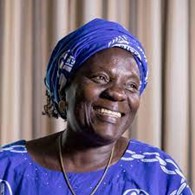Developing the ministries of women and men in the global church
As we continue our series of reflections on the Priorities for Gafcon articulated by the General Secretary, endorsed by the Primates and stated in the Kigali Commitment, we come to numbers 4 and 8:
We will affirm and encourage the vital and diverse ministries, including leadership roles, of Gafcon women in family, church and society, both as individuals and as groups.
Arising from our conference we encouraged the Primates Council also to prioritise discipleship for boys and men.
Why do ministries and leadership roles of women need to be affirmed and encouraged?
1. The example of Mama Gloria
The Gafcon General Secretary, Archbishop Ben Kwashi, regularly speaks with great fondness and admiration for his wife Gloria. He sees their marriage as a team ministry, where his work of church leadership, and hers of caring for children, leading women, and advocacy for the disadvantaged, fit together as an expression of God’s outworking of his Kingdom. Here the clergy wife and mother of six is supporting her husband in his ministry, but he is also supporting and encouraging his wife in her ministry, not just in the ever-expanding home (they have welcomed hundreds of orphans over the years), but as a powerful Christian influence in the wider community. Not all couples can achieve what they have done, but the principle of marriage as mutual support for each other’s ministry can be an example for us all, if women’s roles, work and ministry is valued and encouraged.

Gloria Kwashi
2. The Mothers Union - women as agents for mission in communities
The MU has largely faded away in western Anglican churches, but it is a huge organisation with millions of members across the world, especially in Africa. The HQ is still in London and official publicity reflects the priorities of institutional Anglicanism: Anglican women working together for the relief of poverty and in various programmes of community development. The official website paints a picture of a secular grassroots-based NGO, no doubt as a way of accessing funds. But on the ground, MU groups in parishes and Dioceses are explicitly Christian and in many cases, evangelistic, seeking to bring women and children to Christ and disciple them in bible-based faith, often in contexts of poverty and conflict. The MU, strongly represented at Gafcon Kigali, provides great opportunities for women to receive training for, and exercise ministry gifts including leadership. They deserve support, and the church in the West can be encouraged and challenged by the numbers, energy and faithful service being released and coordinated by the MU.

A typical Mothers Union gathering
3. The challenges facing women and girls in the global south
In the West we have been made aware of specific challenges facing women with the “me too” protests, the issues raised by the murder of Sarah Everard, and campaigns for equal pay for women doing the same work as men. But prospects and rights for girls in developed countries are put in perspective in comparison with many other parts of the world. Women and girls are often at the back of the queue in contexts of poverty, because of traditional attitudes. They suffer constant threat of sexual abuse and violence; forced marriage is still common. Fragile economies mean that there are no benefits for single mothers. Fathers and increasingly mothers are forced to travel far from home, even to the West, for migrant work, leaving young girls and grandmothers to look after homes, and remain at further risk of exploitation. But in many of these places, the gospel has taken root, Churches are strong, providing community mutual help, and people experience the provision of daily bread and protection from their heavenly Father.
4. Gafcon is perceived as being male-dominated and repressive of women
There are many in Gafcon who hold to a “complementarian” view of the roles of men and women, especially as relates to the ordering of ministries in the church. Examples of this view expressed and explained clearly can be found here (Bishop of Ebbsfleet website) and here (FIEC website). Such is the (sometimes wilful) misunderstanding of this position by the secular world, that all complementarians, and even ‘egalitarians’ who associate with them, will at times have been accused of oppressing women.
Gafcon from its outset recognised that faithful bible-believing Christians have come to different conclusions on whether women can be presbyters and leaders of congregations, and that this issue, whilst important, is not of such significance that fellowship between those of differing views is not possible. Some Gafcon-affiliated provinces and Dioceses do not ordain women to the presbyterate (such as Nigeria, Sydney and Anglican Mission in England), while others do, or have leeway to permit it (such as Uganda, certain Dioceses in ACNA, and Anglican Convocation Europe). So, while Gafcon has agreed to a moratorium on women bishops, it has deliberately not taken a position on women’s ordination, seeking to hold together those of different views on this issue while retaining a strong commitment to a shared understanding of the gospel and biblical sexual morality. Also, as the Kigali Commitment reiterates, Gafcon rejoices in and supports life and ministry in all its fullness for women.
5. Biblical teaching on women needed to counter old and new worldview errors
Diminishing of women and girls has always occurred in every culture and continues today, even in the church. Repentance is needed, and renewed commitment to right attitudes and actions. But the church should always be guided by the bible rather than contemporary trends, particularly some secular understandings of ‘womens’ rights’, and even confusing and destructive new philosophies of gender. For example, when Mary responds to the angel’s announcement, she confidently expresses her identity as an individual (“my soul…”), and expresses her understanding of the reality of injustice in the world: rulers need to be brought down, and the humble lifted up. But unlike some contemporary views, she is not led into demands for personal and group rights fuelled by constant grievance. Rather, she sees herself as being fully human rejoicing in relationship to the Lord her saviour. She looks to him to bring justice, and to “fill the hungry with good things”. Faithful Anglican Christian women are demonstrating this attitude of faith all over the world, and are being used powerfully in church and community.
Why was the bit about men and boys added?
The African women at the Kigali conference insisted on this! They reminded the conference that just as pastors and all godly Christian men need to be supported by godly mothers, wives and other women in the church community, so too for women to be uplifted, to fulfil their god-planned potential, they need the support of fathers and husbands.
All cultures face the challenge of how to develop boys into responsible, hard working and caring men who will take care of families and the church, and to be a witness for Christ in the community. In most places around the world, women outnumber men in church. In the most successful churches there is constant reflection and focus on how to present the message of Christ to boys and men, and discipleship, “training in righteousness” which should ideally begin in healthy families.